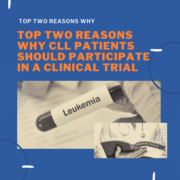Top Two Reasons Why CLL Patients Should Participate in a Clinical Trial
Why exactly should a chronic lymphocytic leukemia (CLL) patient think about joining a clinical trial? In In the “Why Should CLL Patients Consider a Clinical Trial?” program, expert Dr. Adam Kittai from The Ohio State University Comprehensive Cancer Center – The James explains the motivation of clinical trials and the benefits CLL patients may receive from clinical trials.
1. Improve Future CLL Treatments
Clinical trials examine the benefits of a specific treatment for a specific cancer and cancer stage. If you or your loved one participates in a clinical trial, there can be a double benefit to participation. The data gathered from clinical trials assists researchers in improving future CLL treatments for the patient who participates in addition to other CLL patients. Clinical trials can often have underrepresentation by BlPOC patient groups, and it is important for these groups to be represented in trials in order to develop the most refined treatments for all patient races, ethnicities, and genders.
2. Gain Access to Unavailable Therapies
In addition to improved treatments, clinical trial participation has other patient benefits as well. If you or a loved one participates in a clinical trial, the patient gains access to treatments or therapies that may not be accessible in another way. Clinical trials sometimes use different combinations of treatments that haven’t been used previously for a specific stage or type of cancer. Or clinical trials may offer access to a cutting-edge therapy that may ultimately be both more effective while also causing fewer side effects, which could result in a major win-win for patients.
By participating in CLL clinical trials, patients can help improve future CLL treatments for themselves as well as for others. If you have additional questions about clinical trials, ask your doctor or other healthcare provider. If they don’t have information about trials for your specific cancer and stage, they can check with specialists who would more familiarity. You can also find a database of clinical trials at clinicaltrials.gov.










